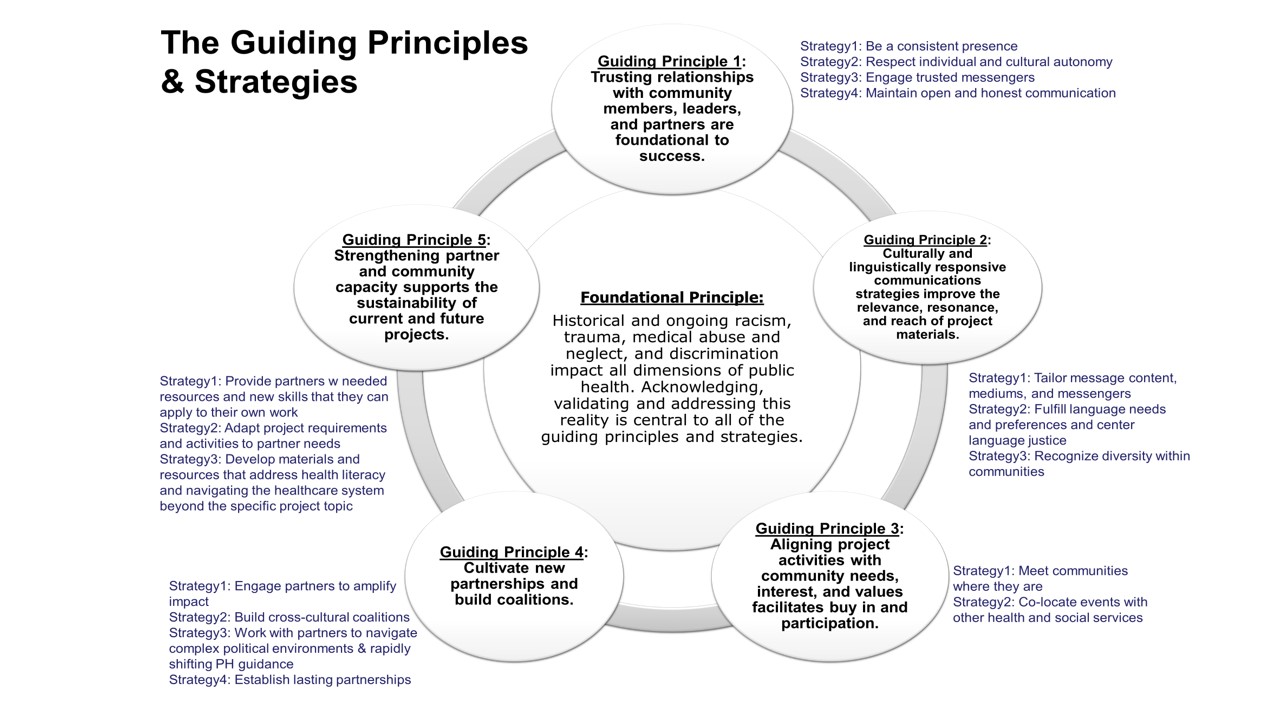Our Work
NNPHI is part of a network of organizations that offer a diverse team of staff and systems needed to carry out the selection, implementation, evaluation, and support for projects across the country to advance vaccine hesitancy and uptake. This network is leading an intensive COVID-19 response, recovery and resiliency effort to mitigate the impact on racial and ethnic minority, rural, and socially or historically vulnerable populations with an immediate emphasis of increasing vaccination access and uptake in focus communities.
The overall approach is designed to address the systemic disadvantages experienced by communities of color, rural communities, and others, such as tribal nations, that face a disproportionate burden of adverse outcomes from public health threats. This work is focused on COVID19 vaccinations but will by design impact influenza and all other adult immunizations.
This project involves a rapid scan of all available evidence and emerging strategies, by network partner Texas Health Institute, which was used to structure a request for proposals from community-based organizations in five regions of the country.

Our Impact
In the first phase of this project, our Network partners THI completed an environmental scan of available evidence to identify promising and emerging practices for advancing vaccine education and uptake in racial and ethnic minority and institutionally underserved communities. The scan identified six promising strategies that can be adapted and trialed in other communities, titled: Environmental Scan of Evidence-Based Promising Practices & Strategies to Improve Vaccine Acceptance Among Racial and Ethnic Minority, Rural and other Underserved Groups.
Our partner Spitfire Solutions have developed an Insight Guide into media and communications among unvaccinated and underserved communities, titled: Research Insights on Core Audiences.
The 2nd phase of this project takes the work out into the communities to reach communities with high rates of unvaccinated people, and vaccine hesitant communities. We are funding work in five geographic areas: Pennsylvania, Minnesota, lower-Central California, Michigan, and NYC.
The 3rd phase of this project includes continuing the work with the five existing awardees and expanding with three new awardees. Additionally, NNPHI in collaboration with Project Partners is publishing a Catalogue with guiding principles, promising practices, and examples on how to reach communities with high rates of unvaccinated people and vaccine-hesitant communities. Alongside the Catalogue, an interactive website will be launched as well for community-based organizations to engage with as well.
Project Partners
 Health Resources in Action (HRiA) is a non-profit consulting organization serving government, non-profits, philanthropy, and communities across the U.S. Our mission is to help people live healthier lives and create healthy communities through prevention, health promotion, policy, and research. With our commitment to racial and health equity and community-centered approaches, HRiA has earned a national reputation as a public health leader.
Health Resources in Action (HRiA) is a non-profit consulting organization serving government, non-profits, philanthropy, and communities across the U.S. Our mission is to help people live healthier lives and create healthy communities through prevention, health promotion, policy, and research. With our commitment to racial and health equity and community-centered approaches, HRiA has earned a national reputation as a public health leader.
 Spitfire Strategies Spitfire is a woman-owned, strategic communication firm that partners with nonprofits and foundations working to make the world a better place. Spitfire’s values are rooted in one core principle: Everyone belongs and has the power to spark change.
Spitfire Strategies Spitfire is a woman-owned, strategic communication firm that partners with nonprofits and foundations working to make the world a better place. Spitfire’s values are rooted in one core principle: Everyone belongs and has the power to spark change.
Funding Awardees
We awarded funding to 5 community-based partners, after a very competitive proposal process:
Through a request for proposals NNPHI selected the African Family Health Organization, Project HEALINGS in MN, The Dolores Huerta Foundation, the Inter-Tribal Council of Michigan, and Public Health Solutions to receive this funding.
 The African Family Health Organization (AFAHO) is a non-profit organization, based in the greater Philadelphia area, that provides health, human, and educational services to African and Caribbean immigrants and refugees (ACIRs). AFAHO addresses the barriers and needs of their community when accessing health and human services, especially those who may be underserved, vulnerable and hard-to-reach, and mitigates these by facilitating access to care to reduce disparities and improve health outcomes.
The African Family Health Organization (AFAHO) is a non-profit organization, based in the greater Philadelphia area, that provides health, human, and educational services to African and Caribbean immigrants and refugees (ACIRs). AFAHO addresses the barriers and needs of their community when accessing health and human services, especially those who may be underserved, vulnerable and hard-to-reach, and mitigates these by facilitating access to care to reduce disparities and improve health outcomes.
 Project HEALINGS is being led by the Chinese American Chamber of Commerce (CACC-MN). CACC-MN has worked with the Multi Cultural Community Alliance (MCCA) Coalition to plan Project HEALINGS (Health Education and Adult Learning Incorporated with Navigating Government Systems), so BIPOC communities can get information directly from trusted sources in cultural/linguistically appropriate ways, in order to take precautions and get vaccinated to protect themselves and their families. This involves the establishment of 5 networks: African-American and Pan African Minnesotans, Asian Pacific Minnesotans, Hispanic/Latinx Minnesotans, Native Americans, and LGBTQ+/Homeless Youth. Project HEALINGS has already begun outreach to communities in more than 30 languages.
Project HEALINGS is being led by the Chinese American Chamber of Commerce (CACC-MN). CACC-MN has worked with the Multi Cultural Community Alliance (MCCA) Coalition to plan Project HEALINGS (Health Education and Adult Learning Incorporated with Navigating Government Systems), so BIPOC communities can get information directly from trusted sources in cultural/linguistically appropriate ways, in order to take precautions and get vaccinated to protect themselves and their families. This involves the establishment of 5 networks: African-American and Pan African Minnesotans, Asian Pacific Minnesotans, Hispanic/Latinx Minnesotans, Native Americans, and LGBTQ+/Homeless Youth. Project HEALINGS has already begun outreach to communities in more than 30 languages.
 The Dolores Huerta Foundation is an organization led by women of color and includes a diverse staff reflective of the populations served, which include Black, Latinx, Farmworkers, Immigrant, Indigenous Mixteco and Triqui communities, LGBTQ+, people of color and unhoused individuals. These rural, hard to reach communities in California’s Central Valley face barriers such as transportation, language access issues, lack of culturally competent health services, and misinformation and disinformation resulting in vaccine hesitancy.
The Dolores Huerta Foundation is an organization led by women of color and includes a diverse staff reflective of the populations served, which include Black, Latinx, Farmworkers, Immigrant, Indigenous Mixteco and Triqui communities, LGBTQ+, people of color and unhoused individuals. These rural, hard to reach communities in California’s Central Valley face barriers such as transportation, language access issues, lack of culturally competent health services, and misinformation and disinformation resulting in vaccine hesitancy.
 The Inter-Tribal Council of Michigan is a non-profit organization governed by a board of tribal chairpersons, with a demonstrated record of establishing strong relationships in tribal communities through their administration of the National Native Network (NNN) for commercial tobacco and cancer prevention and control.
The Inter-Tribal Council of Michigan is a non-profit organization governed by a board of tribal chairpersons, with a demonstrated record of establishing strong relationships in tribal communities through their administration of the National Native Network (NNN) for commercial tobacco and cancer prevention and control.
 NNPHI network partner Public Health Solutions addresses the large, persistent, and increasing health disparities among New Yorkers, and seeks to provide on the ground services to high need communities. They support hundreds of community-based organizations throughout the city, and bridge existing gaps across communities, the public health sector, and healthcare systems.
NNPHI network partner Public Health Solutions addresses the large, persistent, and increasing health disparities among New Yorkers, and seeks to provide on the ground services to high need communities. They support hundreds of community-based organizations throughout the city, and bridge existing gaps across communities, the public health sector, and healthcare systems.
More about the Vaccine Equity Project
Working with the Centers for Disease Control, NNPHI is leading an intensive COVID-19 response, recovery and resiliency effort to mitigate the impact on racial and ethnic minority, rural, and socially or historically vulnerable populations with an immediate emphasis of increasing vaccination access and uptake in focus communities. The overall approach is designed to address the systemic disadvantages experienced by communities of color, rural communities, and others, such as tribal nations, that face a disproportionate burden of adverse outcomes from public health threats.
Resources and Links
AFAHO
The Dolores Huerta Foundation
- April 1st CAAASA Conference Closing Session
- April 3rd Fresno Town Hall
- April 4th Bakersfield Town Hall
- The Dolores Huerta Foundation YouTube Channel
ITCM
- New: “Care For Us By Us” Campaign (YouTube)
- New:
- SMALL BUT MIGHTY COMMUNITY MOBILIZATION CREATED SUCCESSFUL COMMUNITY REACH OF COVID-19 RESPONSES: A CASE STUDY OF THE IOWA TRIBE OF OKLAHOMA, PERKINS FAMILY CLINIC
- CREATIVE USE OF FUNDING TO EXPAND OUTREACH EFFORTS: A CASE STUDY OF THE TOIYABE INDIAN HEALTH PROJECT
- COVID-19 TRIBAL VACCINE EQUITY PROJECT
- National Native Network COVID-19 Vaccine Equity Project
- National Native Network COVID-19 Vaccine PSA
Public Health Solutions
Project Healings
- Project HEALINGS COVID-19 Public-Service Announcement (PSA) Videos: A series of testimonial videos from to display the importance of the COVID-19 vaccine and commenting on vaccination hesitancy among communities.
- Project Resonance: Project Healings worked with local cultural and arts groups to produce a full-length dance production that used cultural symbolism and storytelling to bring Chinese-American communities into dialogue about the impact of the virus on their lives. The production was followed by a lively discussion with the nearly full auditorium. This dance production was well attended and included a discussion after the performance about the impact of the virus on their communities.
Contact Us
For more information, please contact Dr Tracy Wharton at E2A@nnphi.org.
This project is supported by the Centers for Disease Control and Prevention of the U.S. Department of Health and Human Services (HHS) as part of a financial assistance award totaling $5,770,000 with 100 percent funded by CDC/HHS through NNPHI. The contents of this document are those of the author(s) and do not necessarily represent the official views of, nor an endorsement, by CDC/HHS, or the U.S. Government.
 Subscribe To Our Communications
Subscribe To Our Communications